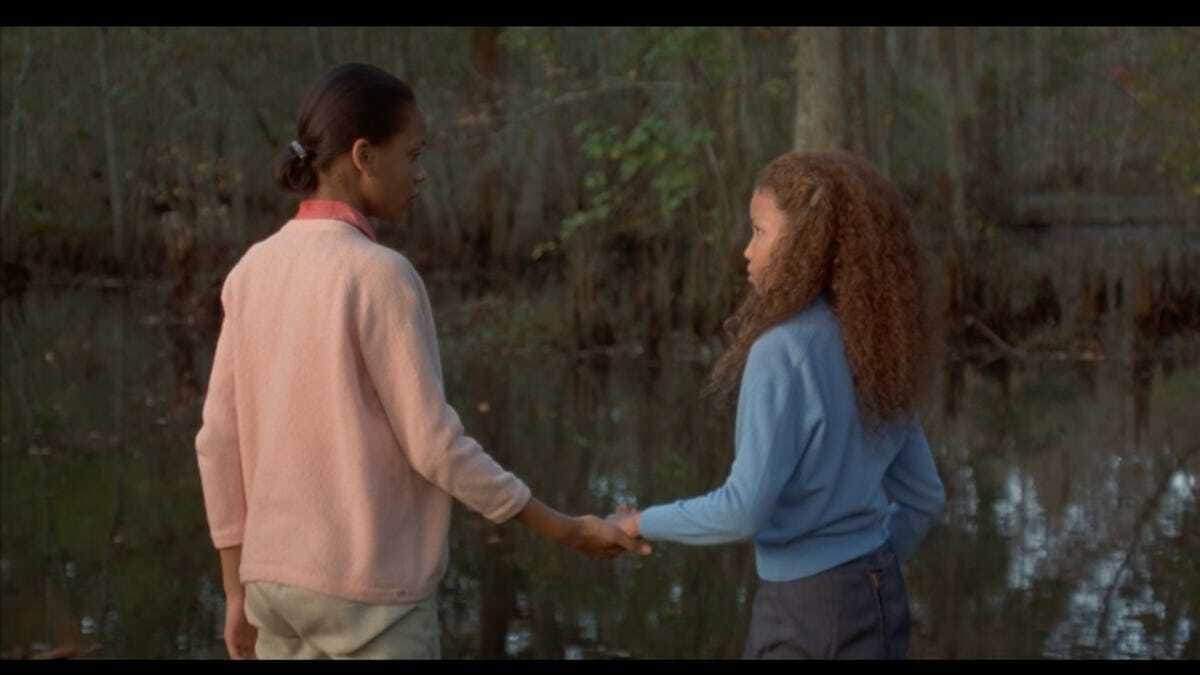
Your narrator for 1997’s indelible drama Eve’s Bayou – the titular Eve – gives away the story in the opening seconds. It’s an elevator pitch, a warning, but most importantly it’s telling you where this story is coming from: memory. Memory is the container and location of this lush, vibrant Southern Gothic story of a young girl, her family, and the snapshot moments that stick with us, and change us, forever.
Eve Batiste — played by 10-year-old Jurnee Smollett in her second ever film, and first lead role — is the middle child of Louise, the town doctor and an absolute charmer of a man (Samuel Jackson), and Roz (Lynn Whitfield), the most beautiful woman he’s ever seen. The story takes place in early summer, and will be over when the season ends, and with a party at the Batiste house; music blaring, champagne flowing, sweat making every man’s shirt see-through and every woman’s hair threatening to collapse. Eve, bothered by the attention her older sister Cisely (Meagan Good, originally cast as Eve years earlier when the movie first started taking shape) is getting, retreats to the barn out back and falls asleep. She awakens to the sounds of people stumbling in, and to the sight of her father with his hands all over and around someone who is not his wife. With the facade cracked, and without the authority and believability of adulthood, Eve must do something, or nothing, with this terrible secret that has been forced upon her.
The characters, and each of their actors and performances, are all cut from the same cloth, which works wonders when basically all of them are a family. There are archetypes all over the place, an trait that lends itself well to sympathizing and empathizing, but also lends itself to twists of the story, and twists of the knife; you are allowed to think you know who this mother is, who this daughter is, who this aunt is, who this father is, but are quickly made aware that any word could come out of them next, any action could be followed by any reaction.
The film is a tragedy. We may not believe it, or want to believe it, but we’re made aware of it, immediately and constantly. That does nothing to curb the smacks of shame and terror that await in the final act, made all the messier by the theme and practice of memory and storytelling and different/differing perspectives.

These themes and ideas are merged masterfully with the craft of cinema to create style and tension and energy. Rarely have I seen the blending of all of the elements of cinema come together so smoothly and collectively. The only element that ever stood out on its own, a louder voice separating itself from the choir, was the soundtrack from the brilliant Terrence Blanchard, which is masterful, and is many different things throughout the story. For each different emotional color the story paints with, Blanchard is there to saturate it, to give it zest.
Equally impressive are the production and costume design, both of which excite and enrich the lives of the characters, without calling attention to themselves or serving anything but the story. The locations and sets where we spend our time are beautiful and purposeful. The photography is stunning, precisely staged by Lemmons and impeccably captured by cinematographer Amy Vincent.
All of the magic of this movie was made possible, for me and my experience with it, by being able to see it (especially the new 4K restoration) in a theater, on the big screen. Every part of a movie is made by human hands, and therefore restricted to the reality that we all live in all the time. So the possibility for an image to stand so tall, and engulf your entire periphery, and for the sound to boom and rattle and shake your seat, creates an entirely new, heightened, electric unreality. The environment can elevate so many stories to heights and depths we would otherwise never think possible. But Eve’s Bayou is special no matter how you see it, of that I am sure.
Kasi Lemmons made a masterpiece of dualities and dueling ideas: dreams and bone-chilling reality, a modern work and also a timeless work. It reads like a novel, yet couldn’t play more cinematically. The film is an enigma: it sounds like it was written fifty years ago, but I felt no dating; it looks like it was staged and recorded seventy years ago, but the images are crisp and vibrant and look better than any of the modern superhero muck that costs ten times as much; the story beats are foretold and sometimes obvious, but their impacts land heavy, regardless. I caught myself leaning forward in my seat, or squirming backward into it, or even covering my eyes as the darkest moments revealed themselves.
Eve’s Bayou is an intimate epic, a film that has always been highly praised, but one that has never crossed my desk, until a local programmer decided to share it with their community. It is many things, to me, now, and to many others. It can be hard to watch, but it is easy to recommend.

This movie has been stuck in my brain for like three weeks now, so much so that I haven’t written anything at length since seeing it. Writing about it was like exercising a (wonderful, masterful) demon. I can’t wait to see it again (gimme that 4K Criterion Collection bluray!).
Back tomorrow with some other new (to me) stuff from this past week.
TTFN,
B